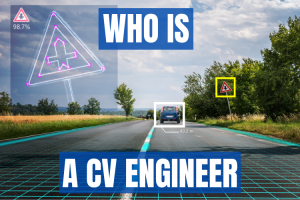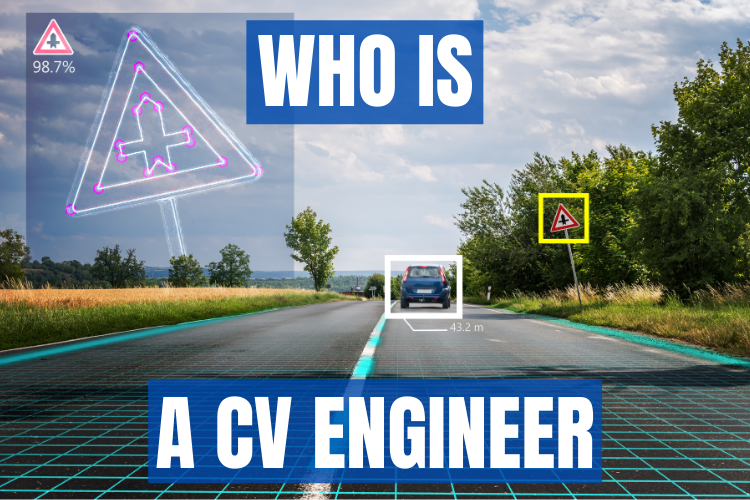Computer Vision Engineer: At the edge of technology

Computer vision engineer is a profession that, although not yet the most common, is already rapidly gaining popularity and offers high salaries even at the beginning of the career. In this article, we will tell you about this specialty.
What is computer vision?
Computer vision is the field of artificial intelligence, which trains computers to interpret and understand the visual world. Using digital images from cameras, videos, and deep learning models, computers accurately identify and classify objects, and then react when they “see” them again. Such techniques are used in a variety of fields: in medicine for diagnosing and detecting tumors in patient images, for navigation in self-driving cars, for facial recognition and filter imposition, as in Instagram and Snapchat, and many others.
Who is a computer vision engineer?
A computer vision engineer is someone who teaches computers how to extract information from images. There are many different names for computer vision specialists: developers, engineers, and researchers (computer vision scientists). Computer vision specialists are rather engineers who use mathematical calculations and programming as their working tools. So, globally, computer vision engineers, computer vision scientists, and computer vision developers are the same.
What tools does he use?
Computer vision developers most often use Python or C++, as well as specialized libraries: OpenCV, Scikit-learn, SciPy, NumPy, Matplotlib, Tensorflow, Caffe, Catboost, and others. In this case, a special value for the developer is knowledge of mathematics and algorithms, as well as continuous immersion in the subject. To work successfully such a specialist always needs to be on the cutting edge of technology and keep abreast of modern algorithms and developments.
What are the perspectives of computer vision?
The perspectives of computer vision day by day become more interesting and good since new technologies are created that make the intellect of computers faster and easier to implement in different areas
Why is it useful?
It is useful as computer vision creates a complete map of the world by analyzing and thus making no important details escape detection. This is very beneficial in the search for people, in the economy, and even in the security of the whole society.
How do I learn a CV?
You are probably not surprised by the constant nature of change within the ML industry, as you know that artificial intelligence moves at the speed of innovation. Here are methods that you can explore and use today to begin your path to becoming a computer vision engineer.
Massive open online course
MOOC, a modern tool for learning introduced in 2008, is currently the preferred method for data scientists and machine learning professionals to gain domain expertise that is often accompanied by recognized accreditations and certificates.
In most cases, MOOCs are significantly cheaper than the traditional method of learning through academic institutions and universities. It is not uncommon to find MOOCs that provide financial support to students through discounts and payment programs.
Another advantage MOOCs have over academic institutions is the flexibility to take courses, online classes, and exams at a time that suits you, as opposed to the restrictive structure of a calendar and time allotments for exams.
Self-study
To become a computer vision engineer in 2021 and beyond, you should refer to practical books on machine learning and computer vision as a learning resource. A computer vision engineer never stops learning, mainly because the field of artificial intelligence is advancing day by day. It is common to meet ML practitioners who study at the same level as students while maintaining a professional career.
You have to read books, blogs, research papers, and articles to make sure you don’t fall behind the ML industry. One of the most recommended books for CV engineers is Hands-On Machine Learning with Scikit-Learn, Keras, and TensorFlow. This book applies to all machine learning professionals, from data scientists to CV engineers.
Reading practical books should be part of your ongoing personal learning strategy. Suppose you find specific areas of your chosen domain in which you might lack expertise, be it mathematics, statistics, programming, or algorithms. In that case, there are tons of practical books that are easy to follow and effective for all ML practitioners of different levels.
There are many free courses, books, forums, and chat rooms on the Internet to help you learn. Here is an overview of popular resources:
– deeplearning.ai
– opencv.org
– dataquest.io
Afterword
Computer vision is a young, fast-growing field at the intersection of science and engineering, where there are still more experiments than ready-made solutions. To grow, a specialist has to constantly learn. But it is the novelty and unconventionality of tasks, as well as the opportunity to create something truly innovative that leads many people to this profession.
